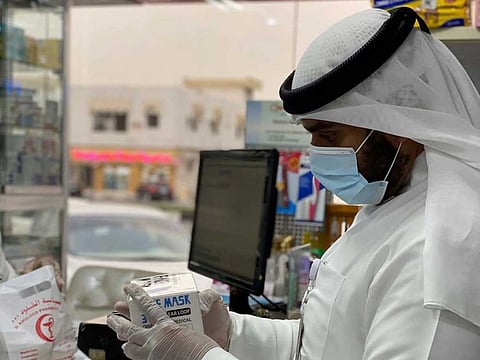No more pharmacy discounts for medicines in UAE
UAE authorities insist prescribed retail prices should be followed at all times

Dubai: Pharmacies in the UAE will no longer offer discounts of 5-15 per cent on prescriptions after the Ministry of Health issued a directive to end the practice. Spot inspections were also carried out following the directive to check possible violations, industry sources confirm.
“The ban on discounts will apply on over-the-counter medicines where the Ministry of Health has set prices,” said a top official at a leading hospital network and which operates multiple pharmacy outlets.
“There was always a rule to not offer discounts - however it was not one that was highly monitored. Hence, there was the practice of offering discounts.
"We had the practice of offering 5 per cent discount on these products. The MoH want us to follow the retail price recommended by them and without discount.”
Pharmacy sources say that violations come with stiff fines, and that in the last few days all outlets have complied with the order. They add that they will be approaching the authorities with requests to extend the discount offers given the market situation.
Why the intervention happened
Industry sources say the authorities did not want to see a rash of competitive discounts being offered by pharmacies to pump sales, especially in such a vital category. The ministry periodically sets the prices on medications for chronic illnesses that are prescribed by physicians or sold over-the-counter at pharmacies. Over the recent past, the cost of a range of life-sustaining meds – mostly imported - were brought down quite significantly.
But sources say that some pharmacy chains had started to offer bigger discounts to get customers to buy off them. Plus, there was constant pressure from medical insurers and TPAs (third-party administrators to bring down the cost of medicine. (Third-party administrators are the businesses that process the medical claims and make the payments to hospitals and clinics on behalf of insuers.)
“Yes, nowadays, discounts at pharmacies were becoming a normal trend, and most TPAs and insurance companies were asking for discounts ranging from 5-10 per cent,” said Vikas Katoch, Chief Operating Officer of Right Health. But going up to 20 per cent discount is not sustainable - I don’t think anyone in the market can agree on these exorbitantly discounted terms.”
Focus on loyalty
Leading pharmacy operators in the country have been pushing loyalty programmes to ensure consumers stick with them through all their medicine purchase needs. Such loyalty deals would now have higher focus now that discounts have been stopped for now. But then again, this would place the smaller operators at a disadvantage in trying to compete on incentives and offers with the big names.
Plus, loyalty points only provide the consumer with offers on non-prescribed medicines, vitamins or skincare brands.
Heavy cost
The healthcare sector is trying to find its bearings after the COVID-19 strike; it’s only over the last month that outpatient services – for those not related to infections or checks – have gone back to about 50-60 per cent of pre-COVID-19 levels at most hospitals and clinics.
But the worry about the sector’s short-term financial health is always there. “When it comes to the challenges involved in the running of private healthcare facilities post-COVID, the pandemic has exposed gaps in the healthcare system, spurred healthcare policymakers to reboot and think differently by expanding the use of telehealth and the future role of medical and hospitality institutions as hubs for care,” said S. Gopinath, Chief Strategic Officer at Canadian Specialist Hospital Dubai.
“The other learning was that it is essential we don’t stick on to just private health, but also learn to deal with public health. It has had a significant impact on the healthcare revenue cycle, layoffs, and stigma visiting the hospital due to safety factors.
“It has resulted in substantial financial strain across all the sectors, including healthcare. The government should help the bleeding industry with waivers and reduce interest rates loans to cope with the current situation.”
Sign up for the Daily Briefing
Get the latest news and updates straight to your inbox









